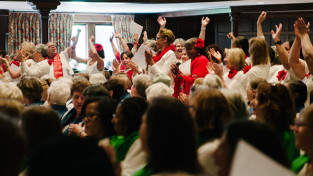“My Voice” Essay: Fighting for Reproductive Freedom for a Half-Century
 Last February, when the Catholic bishops and congressional Republicans attempted to remove contraceptives from the list of medications freely accessible to all through insurance, many members of the class of 1961 were outraged. As part of the first generation to benefit from birth-control pills, we vividly recalled what access to reliable contraception has meant to us—the ability to control our lives, plan our families, have careers—and we needed to speak out.
Last February, when the Catholic bishops and congressional Republicans attempted to remove contraceptives from the list of medications freely accessible to all through insurance, many members of the class of 1961 were outraged. As part of the first generation to benefit from birth-control pills, we vividly recalled what access to reliable contraception has meant to us—the ability to control our lives, plan our families, have careers—and we needed to speak out.
Jennifer Bagster-Collins Seaver, a 1960s Peace Corps volunteer, recalls that “married and unmarried female volunteers were offered birth control so we could serve our country as peacemakers. That’s why I am so passionate about protecting this right.”
Class president Sherry Welles Urner’s long career in women’s reproductive health began in a lab at Harvard Medical School, where “the pill” was synthesized and approved for birth control in 1960. “The experience shaped my career goals and also empowered all women, including me, to make decisions about childbearing. My subsequent career ran the gamut from providing birth control and gynecological care to high-risk pregnancy and infertility care. Reproductive freedom is a precious and sacred principle. All women need to unite to protect these freedoms and loudly protest all attempts to erode them.”
Echoing these sentiments, sixty-five classmates sent a letter to congressional representatives, newspapers, and organizations. We were careful to identify ourselves as “members of the class,” not taking an official class position. Here is what we said:
We are writing as members of the Mount Holyoke College class of 1961 to express our great concern at the recent attacks on access to contraception. We strongly believe that safe and affordable contraception should be available to any woman who chooses it, regardless of income, religion, or job status. Last spring we met to celebrate our fiftieth reunion, and as we talked about our lives in the last fifty years, we commented on the opportunities we’ve all had for further education, new careers, and community service. These opportunities were available to us in large part because we could plan the timing of our families, something our mothers could not do with any certainty. Access to safe and affordable contraception was an important factor in what we’ve achieved. We were the first generation to benefit from birth-control pills. As we think of our mothers and grandmothers, we appreciate how important our opportunity to plan pregnancies has been. At our reunion we met the graduates of 2011—amazing young women from all over the world, poised to become leaders in all kinds of careers—and we could only marvel at how the world has opened up for them. As we watch our daughters and granddaughters mature and pursue their goals and dreams, we must ensure that future generations never lose the right to choose and control their lives. As Mount Holyoke graduates, we benefited from an outstanding education for women, and we know that we are among the most fortunate women in the country. We cannot sit by while the fundamental right to control one’s own life is eroded for any woman. We call on others of our generation to join us in making our voices heard. We call on our legislators to listen to us and oppose any action that would restrict access to safe and affordable contraception for American women.
Positive replies came from many sources. A particularly moving response came from Grainne Dunne ’11, who wrote: “What a gift for my generation to know that we are far from alone in this fight but are fortunate enough to have many generations of strong and determined Mount Holyoke women to support us!”
We learned that our fifty-plus-year perspective on the importance of access to contraception was especially meaningful to younger women, and that the number of signatures we acquired made an impact. We hope others will adapt our letter or write letters of their own on women’s issues.
—By Dee deFerranti Abrahamse ’61 , on behalf of sixty-five members of the class of 1961
This article appeared in the winter 2013 issue of the Alumnae Quarterly.
January 18, 2013










Choose Natural Family Planning
I am writing in response to “Fighting for Reproductive Freedom for a Half-Century.” I take the contrarian view and believe the sexual revolution of the sixties has done much harm and little good. The birth-control pill itself has many side effects, including increasing the risk of breast cancer. When the pill is used to treat reproductive disorders it only relieves symptoms—never getting to the underlying cause of the disease. Also, despite the proliferation of the pill and all the talk about making abortion rare, it is an epidemic of mass proportions. And the real tragedy of the times is the loss of innocence, especially among the youth and the devaluation of human life.
There are natural methods of family planning that are 100-percent safe and just as effective as any artificial contraceptive. I am most familiar with the Creighton Model System, which involves a woman understanding the fertile and infertile times of the cycle. It is highly reliable and can be used throughout a woman’s entire procreative life.
Natural systems treat fertility as a something to be worked with and appreciated rather than like a disease. With knowledge of how one’s reproductive system works comes understanding that fertility is a gift. With wisdom, responsible decisions can be made to bring (or not) new life into the world. And unlike the birth control pill, NaProTechnology and the Creighton Model System treat the root cause of reproductive disease. This is not good news, it is great news.
The US Department of Health and Human Services mandate is an attack on religious liberty, which is protected under the first amendment of the Constitution. Under the mandate, Catholic institutions and employers would be forced to provide healthcare insurance that would include coverage for artificial contraception and sterilization services. There is no “right” to free contraceptives, and no one is forcing anyone to work for a Catholic institution. I am Catholic. I support the bishops and the millions of Americans who value religious freedom.
(posted on behalf of) Mary McPhillips Menendez ’89
Kingston, New Hampshire